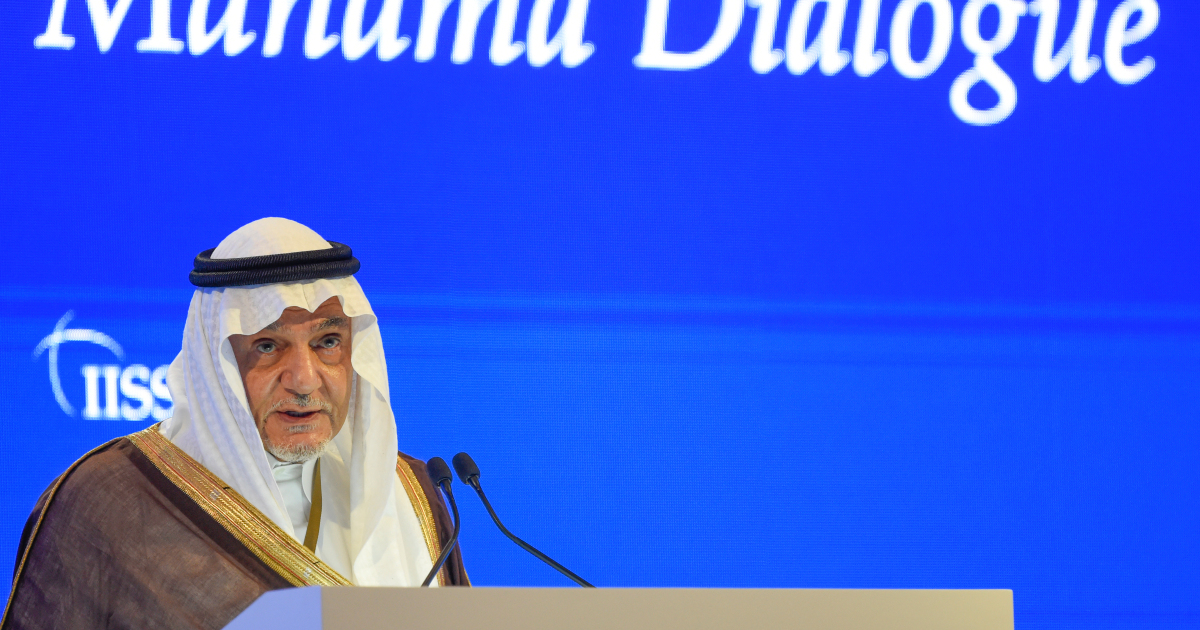A prominent Saudi prince strongly criticized Israel at the Bahrain Security Summit, which the Israeli Foreign Minister attended from a distance, which illustrates the challenges facing any other deals between Arab countries and Israel in the absence of an independent Palestinian state.
It seems that the fiery statements of Prince Turki bin Faisal Al Saud in the Manama Dialogue surprised the Minister of Foreign Affairs of Israel, especially since the Israelis receive a warm welcome from officials in Bahrain and the United Arab Emirates after agreements to normalize relations.
However, these deals have not been resolved due to the decades-old conflict between Israel and the Palestinians. The Palestinians view these agreements as a stab in the back against their Arab brothers and a betrayal of their cause.
Prince Turki bin Faisal opened his remarks by comparing what he described as the perception of Israel as “peace-loving advocates of high moral principles” versus what he described as a Palestinian reality darker than living under the authority of “Western colonialism.”
Israel was “imprisoned [Palestinians] Prince Turki said: “In the concentration camps, under the worst security charges – young and old, women and men, they rot there without resorting to justice.”
They demolish homes as they like and kill whoever they want.
Open wound
The prince also criticized Israel’s undeclared arsenal of nuclear weapons and the “Israeli government’s release of its political followers and their media from other countries to discredit and demonize Saudi Arabia.”
In unusual language, he accused Israel of portraying itself as “a small, existentially threatened country surrounded by bloodthirsty killers who want to eradicate it from existence.”
He said, “Nevertheless, they state that they want to be friends with Saudi Arabia.”
The prince reiterated the kingdom’s official position that the solution lies in implementing the Arab Peace Initiative, a deal sponsored by Saudi Arabia in 2002 that provides Israel with full relations with all Arab countries in exchange for the establishment of a Palestinian state on the lands Israel occupied in 1967.
“You cannot treat an open wound with analgesics,” he added.
Israeli Foreign Minister Gabi Ashkenazi, who spoke directly after Prince Turki, said: “I would like to express my regret for the statements of the Saudi representative. I don’t think it reflects the spirit and the changes that are taking place in the Middle East. “
The confrontation and what happened subsequently between Prince Turki and a confidant of Israeli Prime Minister Benjamin Netanyahu during the summit highlighted the continuing widespread opposition to Israel by many within the Kingdom of Saudi Arabia, despite some state-supported efforts to enhance communication with Jewish groups and supporters of Israel. .
Meanwhile, Ashkenazi reiterated Israel’s position that the Palestinians were responsible for their failure to reach a peace agreement.
Ashkenazi, an ally of Netanyahu’s main rival, Benny Gantz, said, “We have a choice here with the Palestinians, whether to solve it or not, or to go into this blame game.”
Dore Gold, a close confidant of Netanyahu and a former UN ambassador in the audience, noted that Prince Faisal’s statements were “accusations from the past – many of them false.”
The Prince later sparked a former Gould TV appearance “who slanders the kingdom and uses the ugliest descriptions”.
The Prince said: “I think Mr. Dorey Gould should be the last one to talk about past beliefs and attitudes here.”
Prince Turki led Saudi intelligence for more than 20 years and served as ambassador to the United States and the United Kingdom.
Although he does not hold an official position now, his position is seen as closely reflecting that of King Salman.
However, the king’s firm son, Crown Prince Mohammed bin Salman, 35, is seen more willing to quietly reach out to Israel to counter its common rival Iran and boost foreign investment in the kingdom.
Journey is not easy
Bahraini Foreign Minister Abdul Latif Al-Zayani, who was also on stage, sought to calm the differences in his statements.
However, he also stressed the importance of resolving the Palestinian-Israeli conflict on the basis of the two-state solution as envisaged in the Arab Peace Initiative.
The road to peace is not an easy road. “There will be many obstacles along the way,” he said. “There will be ups and downs. But the cornerstone of this path, the path to peace, is the Israeli-Palestinian issue.”
In a clear reference to Iran, Al-Zayani added that a solution to the conflict would also remove the pretext to justify some of the threats to regional security.
Despite Prince Turki’s blunt speech, mutual concern about Iran has gradually brought Israel and the Gulf states closer, and Riyadh itself has been quietly building ties with the Jewish state for several years.
Reports last month that Netanyahu had held secret talks in Saudi Arabia have fueled speculation that a normalization deal with the largest power in the Gulf may be under preparation. But Riyadh denied holding the meeting.
‘Need to see a settlement’
Saudi Foreign Minister Prince Faisal bin Farhan told AFP on Saturday that the kingdom’s position remains firm.
He said: “We have been very clear that in order to move forward with normalization, we will need to see a settlement of the Palestinian conflict and the formation of a viable Palestinian state along the lines of what was envisioned in the 2002 Arab Peace Initiative.” In an interview in Manama.
In response to a question whether this actually excludes establishing relations with Israel any time soon, he said that he is “optimistic that there is a path towards a solution between the Palestinians and the Israelis.”

Zombie specialist. Friendly twitter guru. Internet buff. Organizer. Coffee trailblazer. Lifelong problem solver. Certified travel enthusiast. Alcohol geek.

